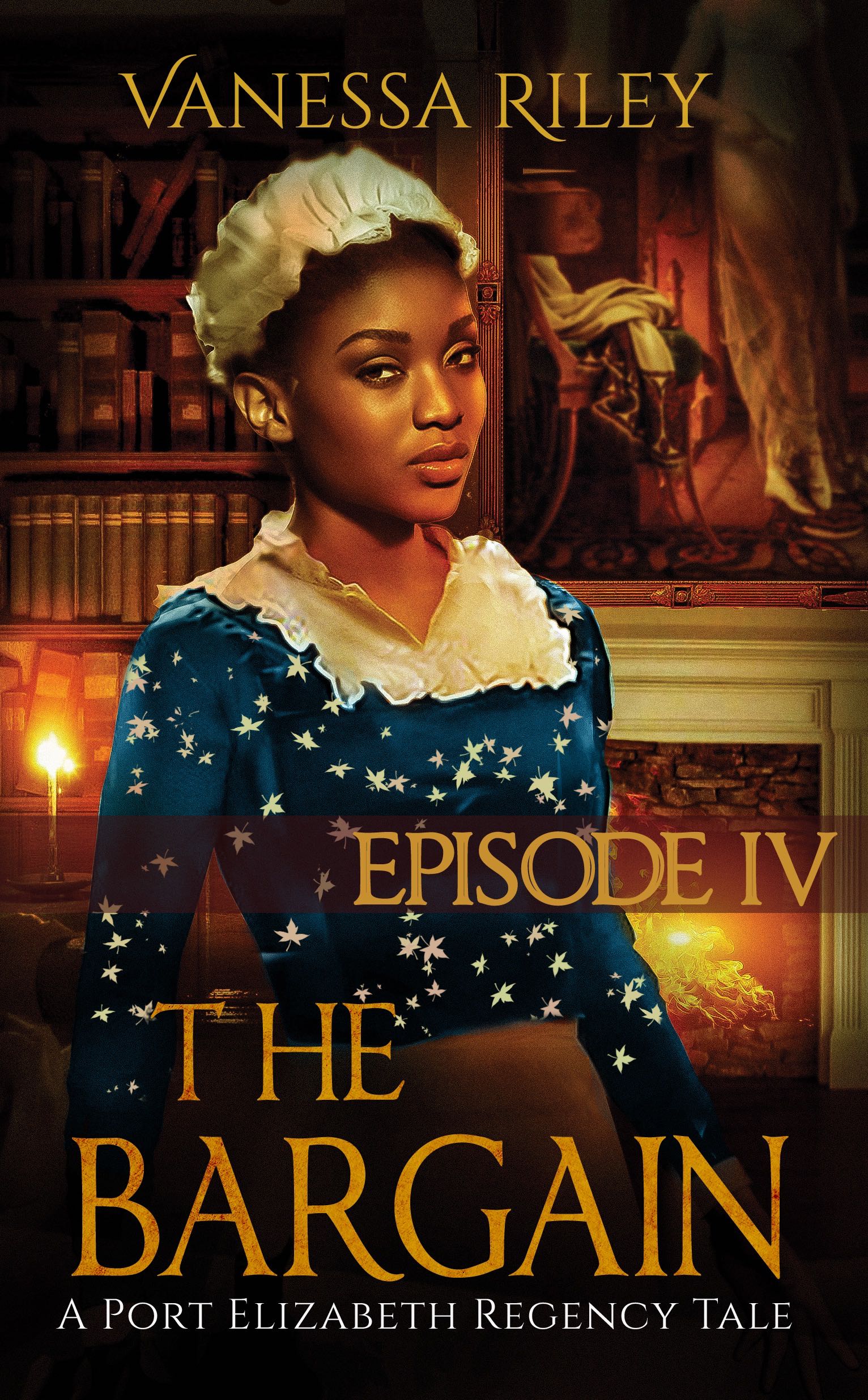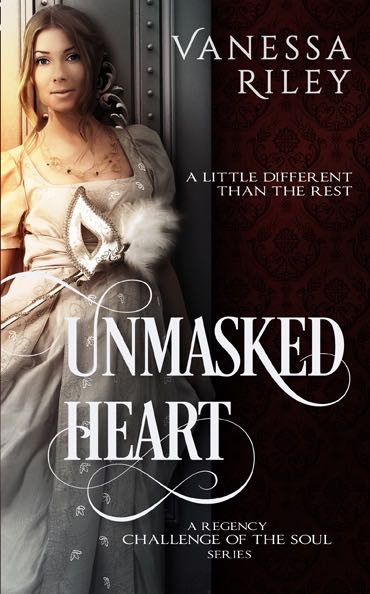The Bargain (7 page)
Authors: Vanessa Riley
Gareth Conroy has exposed his young heir, a pregnant woman, and his late wife’s feisty maid to the dangers of Port Elizabeth. He must make things right, but what is that: admitting defeat and returning to London, staying and committing to a loveless marriage of convenience, or negotiating with Xhosa, a people set on the colonist's destruction?
Whatever his path, there is one thing he’s not ready to do. He's not letting the memory of Precious in his arms fade.
Episode III is available now!

Episode IV of The Bargain
Length: 10 Chapters (25,000 words)
Summary: Saving The Colony
And
A Soul
Status: Coming November 2015.
In Episode IV:
Time is running out for Port Elizabeth. A missing chief and his daughter, tensions among frightened colonists, and the trembling of a difficult labor, threaten to break the fragile bonds of its survival.
Precious Jewell will do what is right to protect those she cares for, even for the man she won't admit to needing.
For Gareth Conroy, death doesn't matter anymore, and he purposes that his spilt blood will bring salvation for the colony, but will he realize too late that no single man of flesh and blood can bring redemption?
Will the burgeoning hope of two stubborn, wounded souls fray or smolder in this exciting conclusion of The Bargain?
Don't miss the exciting conclusion.
Join my
newsletter
to stay informed.
Dear Friend,
I enjoyed writing The Bargain because I dream of Port Elizabeth, a burgeoning colony where all men and women had the opportunity to make their claim and determine their own fates. These stories will showcase a world of intrigue and romance, somewhere everyone can hopefully find a character to identify with as the colonists and Xhosa battle for their ideas and the love which renews and gives life.
Stay in touch. Sign up at www.vanessariley.com for my newsletter. You’ll be the first to know about upcoming releases, and maybe even win a sneak peek.
Thank so much for giving this book a read.
Vanessa Riley
Here are my notes:
Slavery in England
The emancipation of slaves in England preceded America by thirty years and freedom was won by legal court cases not bullets.
Somerset v Stewart (1772) is a famous case which established the precedence for the rights of slaves in England. The English Court of King's Bench, led by Lord Mansfield, decided that slavery was unsupported by the common law of England and Wales. His ruling:
“The state of slavery is of such a nature that it is incapable of being introduced on any reasons, moral or political, but only by positive law, which preserves its force long after the reasons, occasions, and time itself from whence it was created, is erased from memory. It is so odious, that nothing can be suffered to support it, but positive law. Whatever inconveniences, therefore, may follow from the decision, I cannot say this case is allowed or approved by the law of England; and therefore the black must be discharged.”
E. Neville William, The Eighteenth-Century Constitution: 1688-1815, pp: 387-388.
The Slavery Abolition Act 1833 was an act of Parliament which abolished slavery throughout the British Empire. A fund of $20 Million Pound Sterling was set up to compensate slave owners. Many of the highest society families were compensated for losing their slaves.
This act did exempt the territories in the possession of the East India Company, the Island of Ceylon, and the Island of Saint Helena. In 1843, the exceptions were eliminated.
The Regency
– The Regency is a period of history from 1811-1825 (sometimes expanded to 1795-1837) in England. It takes its name from the Prince Regent who ruled in his father's stead when the king suffered mental illness. The Regency is known for manners, architecture, and elegance. Jane Austen wrote her famous novel,
Pride and Prejudice
(1813), about characters living during the Regency.
England
is a country in Europe. London is the capital city of England.

Image of England from a copper engraved map created by William Darton in 1810.
Port Elizabeth
was a town founded in 1820 at the tip of South Africa. The British settlement was an attempt to strengthen England's hold on the Cape Colony and to be buffer from the Xhosa.
Xhosa
- A proud warrior people driven to defend their land and cattle-herding way of life from settlers expanding the boundaries of the Cape Colony.

Image of South Africa from a copper engraved map created by John Dower in 1835.
Abigail
– A lady's maid.
Soiree
– An evening party.
Bacon-brained
– A term meaning foolish or stupid.
Black
– A description of a black person or an African.
Black Harriot
– A famous prostitute stolen from Africa, then brought to England by a Jamaican planter who died, leaving her without means. She turned to harlotry to earn a living. Many members of the House of Lords became her clients. She is described as tall, genteel, and alluring, with a degree of politeness.
Blackamoor
– A dark-skinned person.
Bombazine
– Fabric of twilled or corded cloth made of silk and wool or cotton and wool. Usually the material was dyed black and used to create mourning clothes.
Breeched
– The custom of a young boy no longer wearing pinafores and now donning breeches. This occurs about age six.
Breeches
– Short, close-fitting pants for men, which fastened just below the knees and were worn with stockings.
Caning
– A beating typically on the buttocks for naughty behavior.
Compromise
– To compromise a reputation is to ruin or cast aspersions on someone's character by catching them with the wrong people, being alone with someone who wasn't a relative at night, or being caught doing something wrong. During the Regency, gentlemen were often forced to marry women they had compromised.
Dray
– Wagon.
Footpads
– Thieves or muggers in the streets of London.
Greatcoat
– A big outdoor overcoat for men.
Mews
– A row of stables in London for keeping horses.
Pelisse
- An outdoor coat for women that is worn over a dress.
Quizzing Glass
– An optical device, similar to a monocle, typically worn on a chain. The wearer might use the quizzing glass to look down upon people.
Reticule
– A cloth purse made like a bag that had a drawstring closure.
Season
– One of the largest social periods for high society in London. During this time, a lady attended a variety of balls and soirees to meet potential mates.
Sideboard
– A low piece of furniture the height of a writing desk which housed spirits.
Ton
– Pronounced
tone
, the
ton
was a high class in society during the Regency era.

Shy, nearsighted caregiver, Gaia Telfair always wondered why her father treated her a little differently than her siblings, but she never guessed she couldn't claim his love because of a family secret, her illicit birth. With everything she knows to be true evaporating before her spectacles, can the mulatto passing for white survive being exposed and shunned by the powerful duke who has taken an interest in her?
Ex-warrior, William St. Landon, the Duke of Cheshire, will do anything to protect his mute daughter from his late wife's scandals. With a blackmailer at large, hiding in a small village near the cliffs of Devonshire seems the best option, particularly since he can gain help from the talented Miss Telfair, who has the ability to help children learn to speak. If only he could do a better job at shielding his heart from the young lady, whose honest hazel eyes see through his jests as her tender lips challenge his desire to remain a single man.
Unmasked Heart
is the first Challenge of the Soul Regency novel.
Excerpt from Unmasked Heart: The Truth
Her father sat near Sarah. Nodding his clean-shaven face, his long ash-blonde sideburns curling to his ears, he waved her forward. "Come in, Gaia."
She hadn't expected him to be in here. He usually took refuge in his study on the far side of the house; that is, if he made it out of bed. This couldn't be good.
Gaia swallowed and almost clasped the pianoforte tucked in the curved niche at the threshold. Maybe she could lean against it to regain her composure.
Sarah smiled at her before lowering her gaze. She motioned for Gaia to cross the paisley rug framing the sitting area close to the fireplace. "We need to speak with you."
"Does this mean I can't have the fabric? You can see I'm much grown." She tugged at the snug lines of her bodice.
His lips flattened to a line. "Your mother and I have decided you should be aware of all your responsibilities."
"My responsibilities?" At this, she slipped onto the couch. Why did she have the feeling her cheeks would soon color the same shade of burgundy as the sturdy seat?
Sarah tugged upon her treasured coral necklace then started working embroidery thread from the coiled jute basket near her caned chair. Her gaze seemed to be wandering as her tapping foot lifted her cream-and-rose skirt. "You know your father's estate is entailed to the males of the Telfair?"